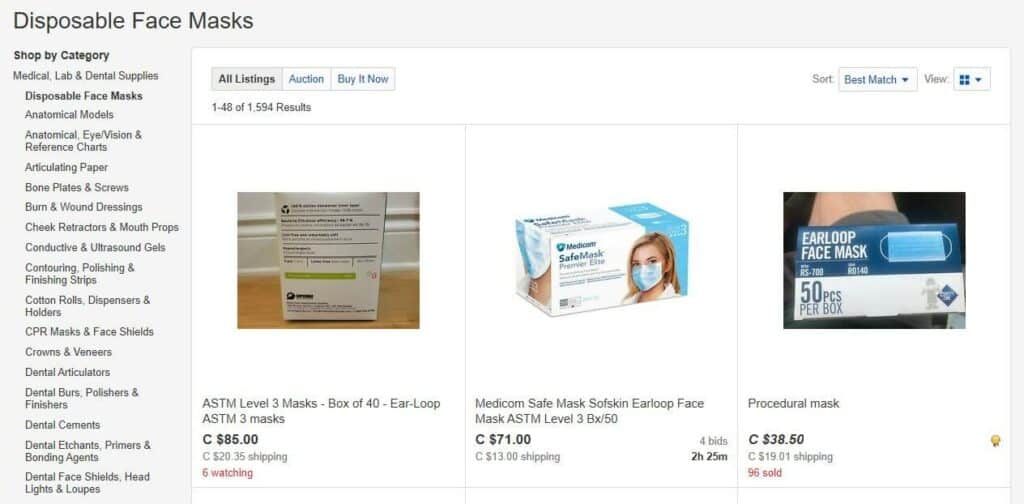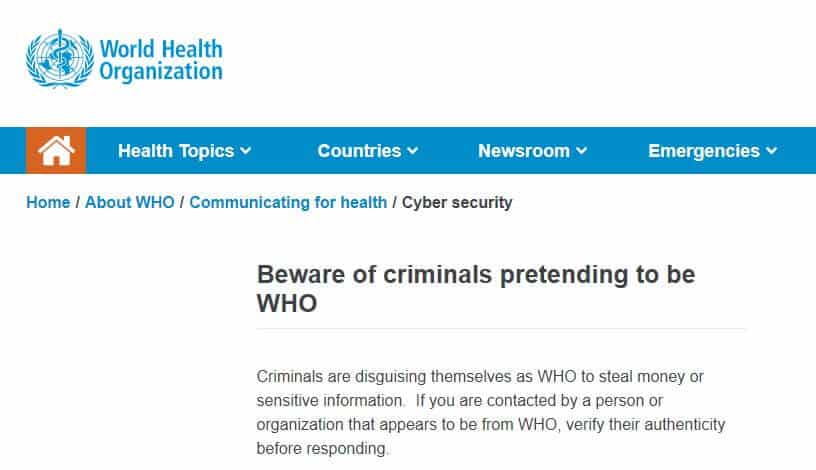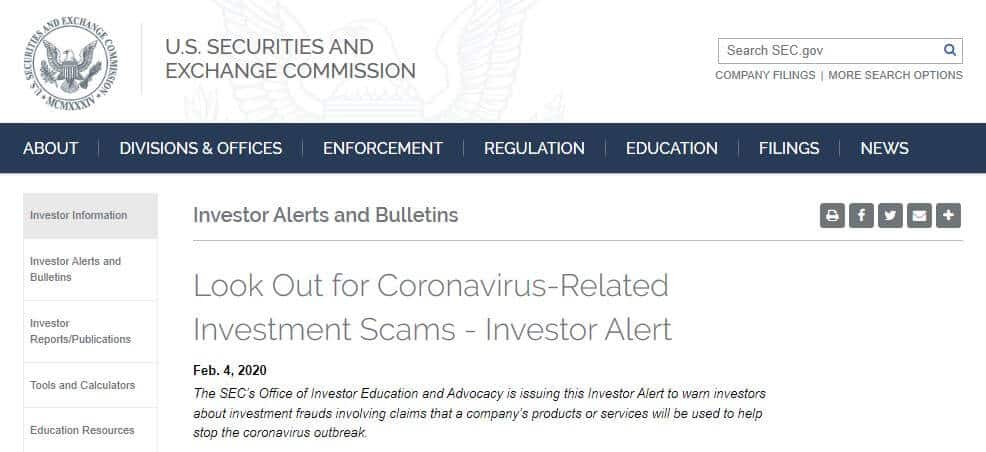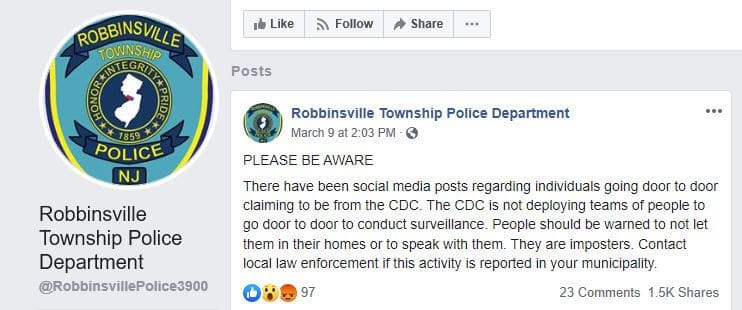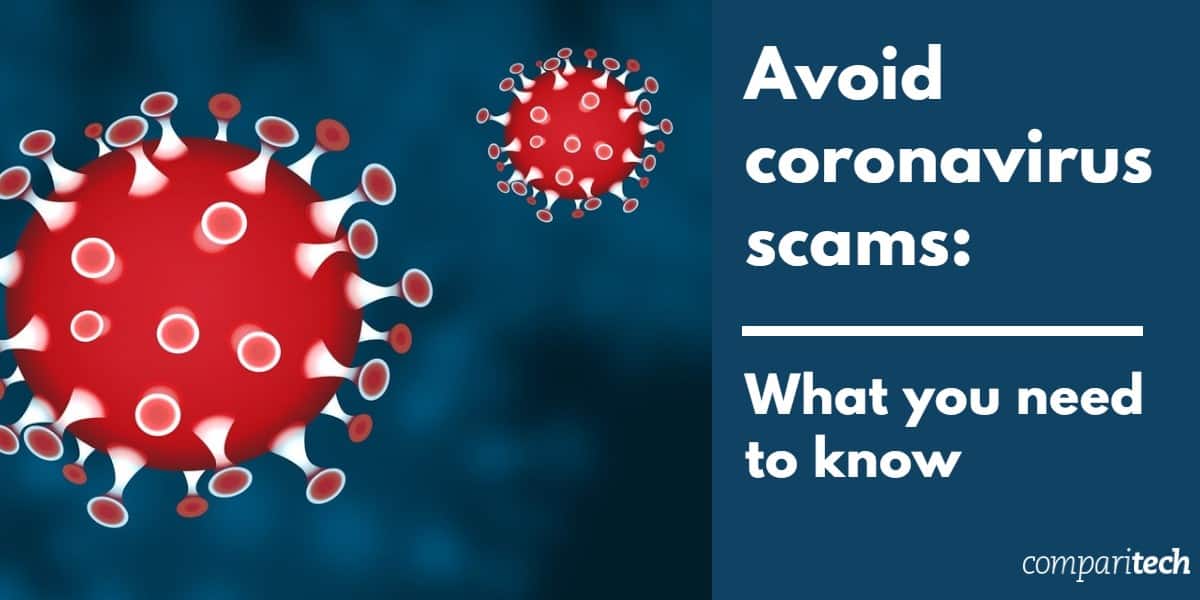
Coronavirus disease (also known as COVID-19) is dominating the news and sending people across the globe into panic. Of course, it was only a matter of time before cybercriminals would find ways to take advantage of this global crisis. As if the prospect of the virus isn’t bad enough, several coronavirus scams have been doing the rounds online.
These include phishing schemes, fake treatment claims, and investment scams, among others. Organizations including the Better Business Bureau (BBB), World Health Organization (WHO), and Federal Trade Commission (FTC) have issued warnings to alert the general public to the circulation of various coronavirus scams.
Thankfully, if you know what to look out for, you can stay one step ahead of cybercriminals and avoid falling victim to their ruse. In this post, we explain more about the COVID-19 scams to watch out for and provide tips to help you stay safe online.
Here are some of the main coronavirus scams you may come across:
Fake treatments
Although some people claim that there is overreaction regarding the severity of COVID-19, let’s face it, it’s a dangerous virus. As such, plenty of people are frantically searching for preventative treatments and cures.
And when there’s demand, there’s supply. New websites and ads popped up, claiming to offer products that can prevent or cure coronavirus. In addition, many existing companies are starting to flaunt coronavirus claims around their products.
For example, proponents of Miracle Mineral Solution (MMS) have long claimed it can cure everything from HIV to autism, even though the US Food and Drug Administration (FDA) has issued multiple warnings to the public not to consume it. However, this solution can still be found for sale on multiple websites.
Claims circulated saying this chlorine dioxide solution—essentially a type of bleach—can help prevent and cure coronavirus.
Elsewhere, at least seven companies have been issued FDA warnings to stop claiming their products have benefits in relation to COVID-19. These include an aromatherapy business, a producer of silver drinks, and a holistic clinic.
It’s not just treatments that companies are selling. Some are making grand claims about disinfectants too. It’s true that some home disinfectant products can help in the fight against the spread of the virus. One group in China knowingly marketed a disinfectant under false claims.
For information about coronavirus symptoms, testing, and treatment, you should consult a healthcare professional or a reputable website such as those run by the WHO, CDC, FDA, or your government’s health department.
It’s worth noting that this isn’t the first time scammers have taken advantage of a global health crisis to peddle questionable wares. Outbreaks of Zika virus, Ebola, and SARS all prompted the FTC and FDA to send warning letters to various companies.
Masks and other equipment
As you’ve probably heard, sales of protective masks have gone through the roof, with many companies struggling to meet demand. Again, when there’s high demand, crooks are standing ready to make a quick buck.
Other items that may be for sale include protective gloves and coronavirus testing kits. The latter are not commercially available, so anyone claiming to sell them is definitely trying to scam you. For example, below is a Russian site (coronavirustest.ru) claiming to sell “the best and fastest virus test” that “will determine if there is a virus in the blood” in just five minutes.
There are several schemes that could play out when it comes to purchasing coronavirus-related products online:
- Non-delivery: There’s a chance that you’ll simply never see these items after payment, as the seller will accept payment and not ship the product. A tell-tale sign of this scam is if you see in-demand items at a very low price, designed to lure in as many people as possible.
- Extortionate prices: In other cases, sellers might be jacking up prices on products they know are in high demand. You may see extortionate prices for some items, including masks selling for up to $1,000. One buyer in the UK claimed to have lost £15,000 trying to purchase masks.
- False claims: You might receive a product that doesn’t live up to claims. For example, with the testing kit above, if you do actually receive a physical product, it’s probably not going to work as promoted. Elsewhere, standards agencies have been quick to crack down on mask claims. For example, the UK Advertising Standards Authority (ASA) challenged Novads OU regarding claims made in several mask advertisements.
- Defective products: Similarly, you may receive a low-quality or defective product. Although it’s real and seemingly fairly priced, it could be expired, damaged, or even used. What’s more, the entities selling these types of goods are unlikely to be offering or honoring return policies.
- Stolen personal information: When you’re purchasing directly from an e-commerce site, it’s tough to know where your information is going. Not only could these sites take your money, but they might also steal your personal and banking information for use in other crimes such as credit card fraud and identity theft.
Some platforms are taking steps to prevent these scams taking place. For example, eBay has blocked all new listings for healthcare masks, hand sanitizer, and disinfectant wipes, and is removing some existing ones. That said, a quick search for face masks on the site still delivered over 1,500 results.
Amazon has pulled over a million coronavirus-related products and Facebook has put a temporary halt to ads for face masks. Google is the latest company to follow suit. What’s more, governments are starting to take a stance against mask resellers, with Japan promising fines of up to 1 million yen ($9,565) or a year in prison.
Sellers of related products should beware too as they might also be the target of scams. In a cancelled payment scam, a buyer will send payment only to cancel it once the product has shipped, leaving the seller out of pocket. Other scammers will purchase goods for resale using a stolen credit card information. This could potentially leave the seller on the hook for the money.
Phishing emails and texts
Another way scammers are leveraging the coronavirus panic is to pilfer information from unsuspecting victims. Phishing emails, as well as phishing voicemails and text messages (known as vishing and smishing, respectively), are intended to trick recipients into handing over private information.
WHO recently issued the following warning regarding phishing emails:
“Criminals are disguising themselves as WHO to steal money or sensitive information. If you are contacted by a person or organization that appears to be from WHO, verify their authenticity before responding.”
One email purporting to come from WHO encouraged recipients to click on a button link to find out about safety measures for preventing the spread of coronavirus. The link takes you to a phishing site which prompts you to enter a username and password. Phishing sites are designed to look like legitimate sites, but actually steal your information. Another phishing email, purporting to be from the CDC, encourages people to click a link to see a list of coronavirus cases in their area.
Note that you might come across multi channel attacks where a fraudster will send both an email and a text message or phone call, to make the ruse seem more believable. Data breaches often result in the leak of a phone number paired with an email, which is how cybercriminals get this information in the first place.
According to CheckPoint, 4,000 coronavirus-related domains have been registered since January. Three percent of these are malicious, and a further five percent are deemed suspicious. This means that domains linked to coronavirus are 50 percent more likely to be malicious compared to other domains registered within that period.
Malware
Not all malicious emails are phishing for information, and other messages might be designed to install malware on the user’s device. A seemingly harmless email could ask you to click a link or attachment, for example, for more information about the outbreak.
When you click the malicious link or attachment, malware is downloaded and executed on your device. One example is a campaign that uses the coronavirus outbreak to spread the popular trojan Emotet via an email attachment. This is also a common method used for installing spyware and ransomware.
Charity schemes
In any global crisis, people tend to look for ways to help their fellow humans financially. Fraudsters prey on their kindness and create fake GoFundMe pages and other charity-based schemes.
For example, you might see people asking for help with repatriation expenses, medical bills, and quarantine-related costs. You may also see fake charities purporting to help with everything from feeding children to helping animals in the wake of the virus.

These scams are often promoted through social media, but may come through email, possibly even from a friend who has fallen for the scam.
Note that there are still many worthy causes to donate to at this time, including many genuine GoFundMe and similar pages, but you should always proceed with caution. In addition, lots of reputable charities are ramping up efforts to help those in need in the midst of this crisis and need your help. Just be sure to do some research before sending funds.
Investment scams
With the markets taking a massive hit, people are understandably worried about protecting their investments. Enter scammers with the solution to all your problems. In February, the US Securities and Exchange Commission (SEC) issued a warning to the public to be on the lookout for coronavirus-related investment scams.
One type of scheme is tied to products and services that may be helpful in coronavirus prevention, detection, or treatment. Scammers claim that stocks of publicly-traded companies providing these products or services will increase dramatically. They persuade people to purchase these stocks with promises of future gains.
Then, once the stock price has increased (due to mass interest), the scammers sell their stock at the inflated price. The stock price plummets, leaving duped investors with worthless stocks. This is known as a “pump-and-dump” scheme.
General misinformation
While some fake news can be seemingly harmless, in many cases, it can have a real impact on people’s lives. It can even prove fatal as was revealed in Iran where more than 40 people have died after consuming bootleg alcohol, believing it would cure the coronavirus.
Misinformation may be used for various reasons, including to ramp up social media engagement or drive website traffic, but it can have serious consequences. For example, overstating the number of coronavirus cases in a particular area could send nearby residents into a frenzy.
Fake news about the coronavirus outbreak may also be used to sway public opinion about the government, political parties, and individual politicians. It can have a significant and lasting impact on the political climate of various countries.
In some cases, governments have been implicated in the spread of fake news. For example, the US has accused Russia of spreading disinformation regarding the coronavirus. Officials claimed to have uncovered a network of thousands of social media accounts spreading conspiracy theories that essentially blame the US for the outbreak.
Offline impersonation scams
Although this article is focused on online scams, it’s worth mentioning that police departments in New Jersey recently issued a warning about scammers going door to door posing as CDC officials.
It’s unclear what intentions these imposters have, but it’s worth putting the word out to friends and family, especially the elderly and vulnerable. The CDC is not deploying teams to go door to door, and you should not let these people into your homes.
Tips to help you avoid COVID-19 scams
Knowledge of these scams is the best defense. Note that scammers will continuously find ways to take advantage of people, so as the situation continues to unfold, you need to be on high alert for other types of schemes that might evolve. Here are our top tips for avoiding coronavirus scams:
1. Use common sense
Although this global crisis is inciting panic, it’s important to keep a level head and think rationally. For a start, if something seems too good to be true, it likely is. If you’re being offered “secret information” or an “exclusive deal” by a stranger, consider if this is legitimate.
It’s also worth noting that friends and family members may not be educated about these schemes and could be more likely to make poor decisions when feeling scared or overwhelmed. It’s especially important to check in with elderly friends and relatives. According to statistics, seniors are at high risk of developing serious symptoms due to the coronavirus. This makes it even more likely than usual that they’ll be targeted with scams.
2. Learn to spot phishing emails and sites
Phishing emails are becoming more sophisticated, but there are still some common tell-tale signs that something’s not right. First, look at the sender’s email address and check that it looks real. Scammers will often register domains with slight misspellings to make an email address look legitimate.
Other common signs of a phishing email are poor spelling or grammar, and a sense of urgency in the tone. Charity scams in particular will often use high-pressure tactics to get you to hand over money quickly. If you have any doubt about the authenticity of an email, contact the company directly using a phone number or email address found via a web search.
Government agencies such as the WHO or CDC will never ask you to send money or banking information.
Never click attachments or links in an email that you don’t fully trust. If you’re unsure about where a link is sending you, you can hover over the anchor text to see the URL. If it doesn’t match what you’re expecting, don’t click.
If you do end up clicking a link, there are ways to check if you’ve landed on a phishing site. Looking for a secure site (with HTTPS in the address and a padlock symbol in the address bar) can help, although many phishing sites now have this feature. Other tell-tale signs of a phishing site are outdated copyright information, poor grammar, and lack of an “about” page and contact information.
3. Only purchase from trusted sites
If you do need to stock up on supplies, be it medication or other household goods, make sure you’re purchasing from reputable sites. As mentioned, looking for HTTPS sites can help, but it’s not foolproof. Ideally, stick to well-known companies and avoid third-party sellers.
When you make any purchase online, it’s better to use a credit card instead of a debit card. Credit cards usually offer more protection and give you a better chance of getting your money back if you are scammed.
4. Use antivirus software
While antivirus software won’t help in the social engineering element of a scam, it can help protect you to some extent. A good antivirus should be able to detect and block known threats, for example, to prevent malware from being downloaded onto your device.
If malware does find its way through initial defenses, antivirus software might be able to detect it so you can remove it as soon as possible.
5. Visit reputable sites for coronavirus information
The problem with getting all of your news from your social media newsfeeds is it’s often difficult to tell where it’s really coming from. Even some reputable news sites pick up on stories with misinformation.
For reliable coronavirus news, you’re best off sticking with sites like those run by the WHO and CDC. These may not be updated as regularly as your favorite tabloid news site, but the information will likely be more reliable.
While severity of the COVID-19 outbreak will diminish eventually, it looks set to be around long enough for many more scams to take place. In general, these types of schemes are under-reported. Often, people assume that no one will be able to help them, or they feel embarrassed about falling for a scam.
The spread of coronavirus could compound both of these factors. Due to the widespread panic we’re seeing, people are likely to fall for more obvious scams than usual. Plus, with the current global crisis, they might feel that their seemingly small misfortune is too insignificant to report.
However, if you’ve fallen victim to a scam or suspect scam-related activity, it’s prudent to report it as soon as possible. If you’ve lost money, no matter how hopeless it seems, there’s a chance you could be reimbursed. Perhaps more importantly, it’s important to get the word out to family, friends, and the general public to minimize the number of people who become victims.
We go into detail about how to report a scam in a separate post, but here’s a brief list of where to turn depending on which country you’re in. Note that you should also inform your local law enforcement agency of any scams.
US
- National Fraud Information Center (NFIC) (Phone 1-800-654-7060)
- FBI Internet Crime Complaint Center
- National Center For Disaster Fraud (Phone 1-866-720-5721)
- Federal Trade Commission (Phone 1-877-382-4357)
- Better Business Bureau (Phone 1-703-525-8277)
- The attorney general’s office for your state
- Postal Crime Hotline (Phone 1-800-654-8896)
UK
Canada
Australia
- ACCC Scamwatch
- ReportCyber
- Department of Human Services Scams and Identity Theft Helpdesk (Phone 1800 941 126)




